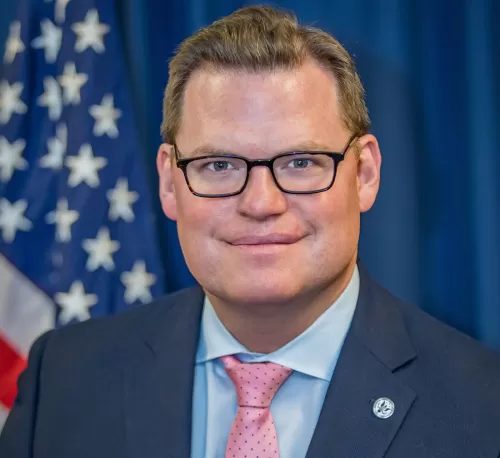The Caption is: NCUA Vice Chairman Kyle S. Hauptman
As Prepared for Delivery on October 21, 2021
Thank you, Rachel, for your presentation. The expansion of permissible CUSO Lending has been under consideration for many years now. Most recently in NCUA Regulatory Reform Taskforce’s report 2 issued in 2018.
Under the Federal Credit Union Act, federal credit unions may invest in and make loans to CUSOs. The modern CUSO Rule was passed by the NCUA in the early 1980s. In 2008, the list of preapproved activities and services in the CUSO Rule added two new categories of permissible CUSO activities — credit card loan origination and payroll processing services.
This a long way of saying, CUSOs have been making direct consumer mortgage loans, business loans, and student loans for decades without negatively impacting credit unions. Without CUSOs many credit unions — especially small ones — would not have had the scale to compete in the mortgage, business, credit card and student lending areas. Credit unions, through their CUSOs, have been able to provide members with more choice in the marketplace.
In 2008, the NCUA declined to allow CUSOs the authority to make direct consumer loans. A lot has happened since 2008, and that is why we are here today.
We’ve all probably noticed the change in TV advertisements for automobiles. There are fewer ads for places like Bethesda Chevrolet and more for new online services like Carvana. If you Google something like “What’s the price of 2018 Honda Civic?” the top search results are for online car-buying services. Consumers are now using their mobile phones to comparison shop for the best car and financing without ever having to go into a dealership. The pandemic only accelerated this evolution, and there’s never been more price transparency. This is all similar to what sites like Travelocity did to prices for hotels and airlines.
The technology and scale necessary to compete in an online consumer and auto marketplace is beyond the reach of most individual credit unions. The U.S. Treasury Department has noted that “non-bank digital lenders have gained outsized attention, driven in part by their rapid rate of growth and employment of new technology intensive approached to lending.”
From the consumer angle, this rule just adds one new way to buy a car. All the other methods remain in place. And obviously the best consumer protection has always been a competitive market. In a world where consumers use their mobile phone to comparison shop for pricing — why would they take a worse deal if they know they can get a better deal someplace else?
Credit union members will still be able to get pre-approved by their credit union and have a check-in-hand while talking to an auto dealer. And I can’t not mention the folks who’ve expressed concern adding this new car-buying option will somehow result in consumers being ripped-off. Those critics all have one thing in common: none of them think that they, personally, would wind up paying more, they just think these other people will pay more than necessary. Paternalism has always made for bad policy.
CUSOs follow state and federal consumer protection laws already. The digital era also makes the threat of a scalding online reviews a significant risk to businesses that don’t treat consumers well. I’ll also mention that NCUA continually reviews existing rules, which is why we’re going to monitor how this rule actually works in the real world, including watching consumer issues and if CUSOs are promptly delivering these loans to credit unions. These rules are sometimes more art than science. And other than Michelangelo’s “David,” there are few perfect works of art. So, if this rule needs to be tweaked in the future, then we’ll tweak it.
Thank you, Mr. Chairman. That concludes my remarks.




